Express Logistics Services Compared for Speed, Cost, and Reliability
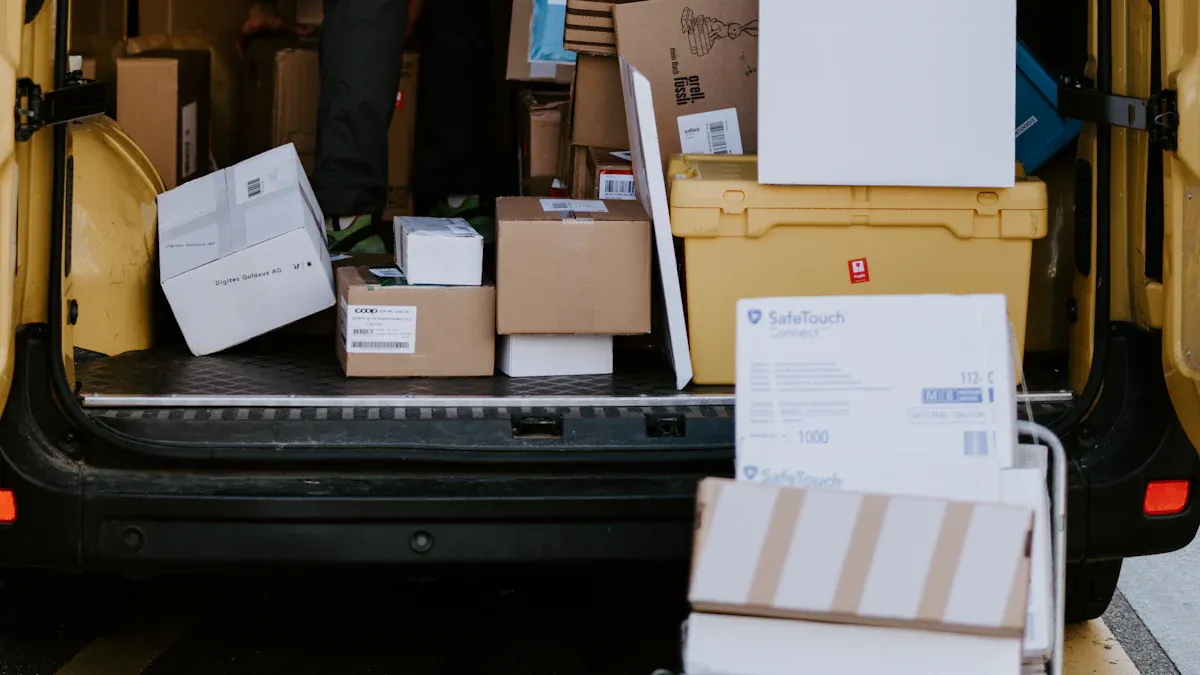
When you choose an express logistics provider, you want fast delivery, low cost, and reliable service. FedEx leads in speed for urgent shipments. UPS and USPS offer strong value for cost-conscious businesses. DHL stands out for reliability, especially in global markets. Amazon Logistics continues to grow in volume and supports e-commerce shipping. Check the latest market share numbers below to see how each provider compares in the express logistics services comparison.
Company | Volume Share | Revenue Share |
|---|---|---|
FedEx | 19% | 33% |
UPS | 24% | 37% |
USPS | 31% | 16% |
Amazon Logistics | 15% | 12% |
DHL | N/A | 15% (global) |
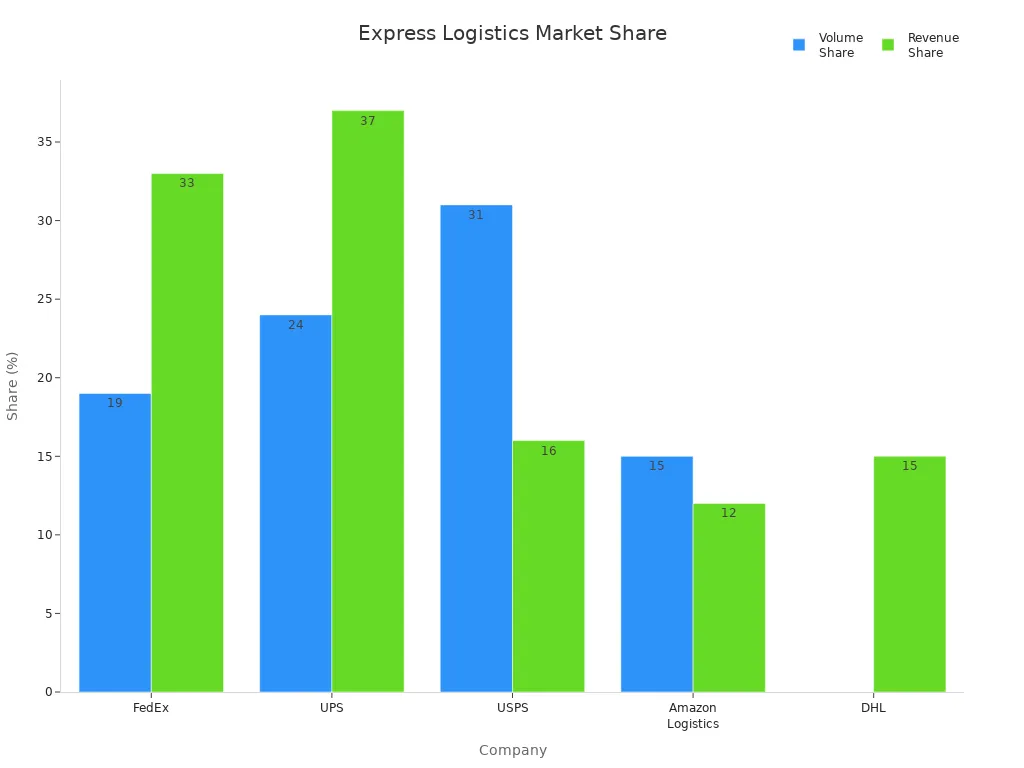
Key Takeaways
FedEx is the best choice for fast delivery, especially for urgent packages. Use FedEx Priority Overnight for next-day service.
For cost-effective shipping, USPS and UPS offer the lowest rates for small packages. Choose USPS Ground Advantage for budget-friendly options.
DHL is the most reliable provider for international shipping. It covers over 220 countries and ensures timely delivery.
Amazon Logistics is ideal for e-commerce businesses, providing fast delivery and advanced tracking for online orders.
Always match your shipping needs with the right provider. Consider speed, cost, and reliability to make the best choice.
Key Findings at a Glance
Choosing the right express logistics provider can help you save time and money. You want to know which company delivers fastest, which one costs less, and which one you can trust for every shipment. Here is a quick guide to help you decide.
Best for Speed
FedEx Express stands out for speed. You get urgent packages delivered overnight or even the same day in many areas. FedEx Priority Overnight and FedEx 2Day AM offer some of the fastest delivery options. UPS Next Day Air Saver® and UPS 2nd Day Air® also provide quick service, but FedEx often wins for the fastest guaranteed delivery.
FedEx Priority Overnight: Arrives the next morning in most cities.
UPS Next Day Air Saver®: Delivers by end of next business day.
Amazon Logistics: Fast for e-commerce orders, especially with Prime.
Tip: If you need your package to arrive tomorrow, FedEx Express is usually your best choice.
Best for Cost
You want to keep shipping costs low. USPS and UPS offer some of the most affordable rates for standard packages. USPS Ground Advantage and UPS® Ground are popular for budget-friendly shipping. FedEx and DHL tend to cost more for express services, but you get faster delivery.
Here is a table showing average shipping costs for standard packages:
Courier | Cost |
|---|---|
USPS Ground Advantage | $9.19 |
UPS® Ground | $8.12 |
USPS Priority Mail | $11.38 |
UPS 2nd Day Air® | $18.10 |
FedEx 2Day AM | $33.75 |
UPS Next Day Air Saver® | $37.97 |
FedEx Priority Overnight | $38.12 |
DHL Express | Varies |
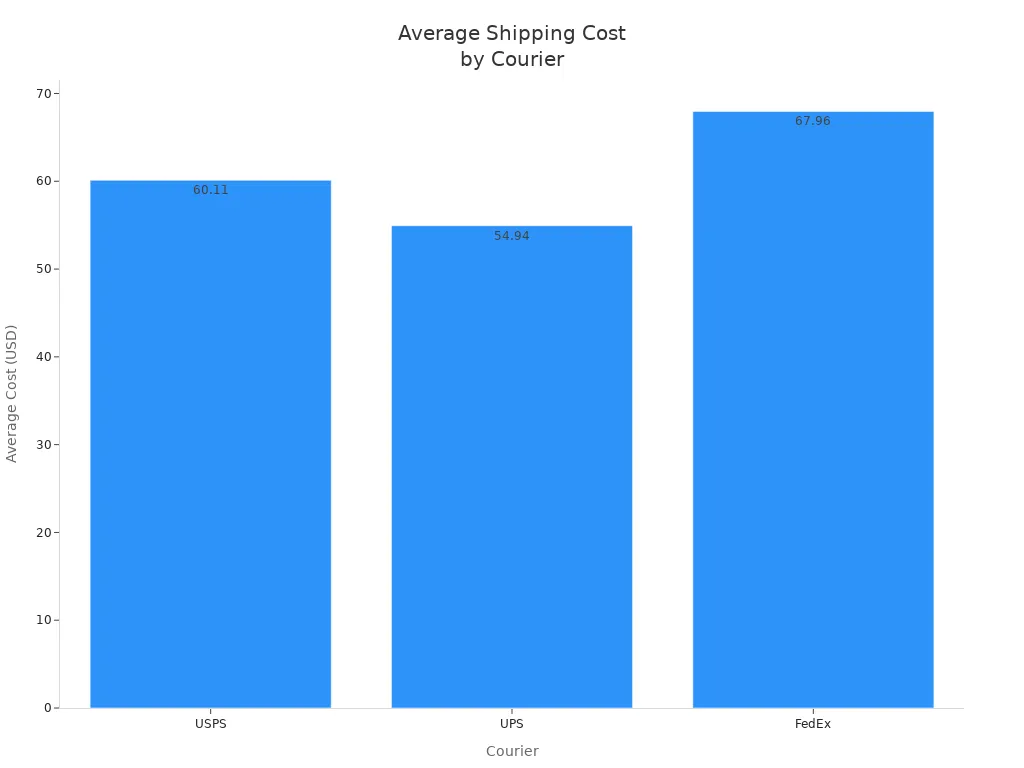
USPS Ground Advantage and UPS® Ground give you the lowest prices for non-urgent shipments.
FedEx and UPS offer competitive rates for express services, but you pay more for speed.
Note: If you ship many packages and want to save money, USPS and UPS are good choices.
Best for Reliability
Reliability means your package arrives on time and in good condition. DHL Express leads in reliability, especially for international shipments. DHL covers more than 220 countries and has strong networks in Europe and Asia-Pacific. Amazon Logistics also scores high for reliability in e-commerce, with advanced tracking and fast issue resolution.
Provider | Additional Notes | |
|---|---|---|
DHL | 220+ | Strongest in Europe and Asia-Pacific, with coverage in emerging markets |
FedEx | 220+ | Strong North American base, growing international presence |
UPS | 220 | Balanced global coverage, strong in North America and Europe |
DHL Express: Best for international reliability and global reach.
Amazon Logistics: Reliable for e-commerce and last-mile delivery.
UPS and FedEx: Reliable for domestic and international shipments.
If you ship worldwide, DHL Express gives you the most dependable service. For online orders, Amazon Logistics keeps your customers happy.
In this express logistics services comparison, you see FedEx leads in speed, USPS and UPS win for cost, and DHL stands out for reliability and global reach. Amazon Logistics continues to improve for e-commerce shipping. Use this guide to match your shipping needs with the right provider.
Express Logistics Services Comparison: Top Providers
When you look at express logistics services comparison, you see that each provider brings something special to the table. You can choose the best fit for your business by understanding their strengths.
FedEx Express
FedEx Express gives you fast delivery and a strong global network. You can send urgent packages overnight or even the same day in many cities. FedEx invests in technology, using AI and machine learning to improve tracking and speed. You also benefit from their commitment to sustainability, as FedEx works to reduce emissions and modernize its fleet.
UPS
UPS stands out for its reliable service and wide coverage. You get fast shipping options for both domestic and international deliveries. UPS uses advanced technology to make sure your packages arrive on time. The company also leads in environmental efforts, with many electric vehicles in its fleet. UPS offers good value for larger shipments, making it a smart choice for businesses with heavy packages.
DHL Express
DHL Express is your go-to provider for international shipping. You can reach over 220 countries with their network. DHL focuses on reliability, especially for cross-border deliveries. You get strong coverage in Europe and Asia-Pacific. DHL also invests in digital tools to help you track shipments in real time.
USPS
USPS gives you unmatched reach in the United States. You can ship small packages at low prices. USPS focuses on reliability and affordability. The company continues to modernize its fleet and improve service. You get good coverage for rural and remote areas, which is important for many businesses.
Amazon Logistics
Amazon Logistics supports e-commerce shipping with fast and reliable delivery. You get advanced tracking and quick issue resolution. Amazon uses technology to optimize routes and improve last-mile delivery. The service works well for online stores and businesses that need flexible shipping options.
Tip: Use this express logistics services comparison to match your shipping needs with the right provider. Each company offers unique benefits for speed, cost, and reliability.
Coverage and Network: USPS has unmatched reach in the U.S., while UPS and FedEx excel globally.
Speed and Reliability: FedEx and UPS deliver faster than USPS, which focuses on reliability.
Pricing: USPS is most economical for small packages; UPS and FedEx offer better value for larger shipments.
Technology and Innovation: UPS and FedEx lead in AI and machine learning.
Environmental Commitment: UPS and FedEx are proactive in sustainability.
Service Offerings
Domestic Shipping
You have many choices for domestic shipping. Each provider offers different options to fit your needs. FedEx gives you fast and flexible services, including overnight and same-day delivery. UPS and USPS provide reliable ground shipping for packages of all sizes. You can also use specialized services like full truckload (FTL) or less-than-truckload (LTL) for freight shipments. These options help you move small or large loads across the country.
Provider | Shipping Options |
|---|---|
FedEx | FedEx Freight® Priority, Economy, SameDay®, First Overnight®, 1Day®, 2Day®, 3Day®, One Rate, Standard, Expedited |
UPS | Ground, Next Day Air®, 2nd Day Air®, 3 Day Select®, SurePost® |
USPS | Ground Advantage, Priority Mail, First-Class Mail, Parcel Select |
Express Logistics |
Tip: Choose LTL for small freight under 15,000 pounds. Use FTL for full truckload shipments.
International Shipping
You can ship packages worldwide with major express logistics providers. FedEx, UPS, and DHL offer premium express services with fast delivery times. DHL stands out for its strong network in Europe and Asia-Pacific. USPS gives you cost-effective options for standard and economy shipping, but delivery takes longer. Amazon Logistics focuses on e-commerce shipments and continues to expand its global reach.
Carrier | Strengths | Service Options | Delivery Times | Cost Structure |
|---|---|---|---|---|
FedEx | Express services | Varies by service | Higher for express | |
UPS | Reliable for express shipments | Multiple service levels | Varies by service | Competitive rates |
DHL | Strong in international markets | Express and economy options | Fast for express | Higher for express |
USPS | Cost-effective for economy shipping | Economy and standard services | Slower for economy | Lower rates |
Note: DHL is best for fast and reliable international shipping. USPS helps you save money on slower deliveries.
Value-Added Services
You can improve your shipping experience with value-added services. Providers offer assembly, kitting, and unique packaging to make your products stand out. You can request repackaging or rebranding for special promotions. Quality control inspections help ensure your products meet standards before delivery. Some companies offer light manufacturing, specialized handling for hazardous or temperature-sensitive goods, and inventory management.
Assembly Services: Prepare products with high quality and consistency.
Kitting Services: Combine items into single packages for easy handling.
Unique Packaging Services: Customize packaging for a better customer experience.
Repackaging and Rebranding: Update packaging for promotions or branding.
Quality Control Inspections: Check products before shipping.
Light Manufacturing: Add final touches to products.
Specialized Handling: Ship hazardous or sensitive items safely.
Inventory Management: Track and manage your stock efficiently.
If you want to streamline your shipping process, ask about these extra services. They help you save time and keep customers happy.
Pricing
Standard Rates
You want to know how much it costs to ship a package with each provider. Standard rates depend on the size and weight of your package. USPS gives you the lowest rates for small boxes. UPS and FedEx charge more for small shipments, but their prices become competitive for larger boxes. You pay extra for express services, especially for envelopes.
Package Size | UPS Rate | FedEx Rate | |
|---|---|---|---|
Small Box (1 lb) | $6.83 | $10.70 | $10.70 |
Medium Box (20 lbs) | $14.50 | $17.02 | $17.13 |
Large Box (70 lbs) | $44.46 | $30.91 | $30.98 |
Extra Large Box (100 lbs) | N/A | $66.16 | $66.12 |
Carrier | Flat Rate for Envelope (Express Service) |
|---|---|
USPS | $30.45 |
UPS | $62.97 |
FedEx | $63.63 |
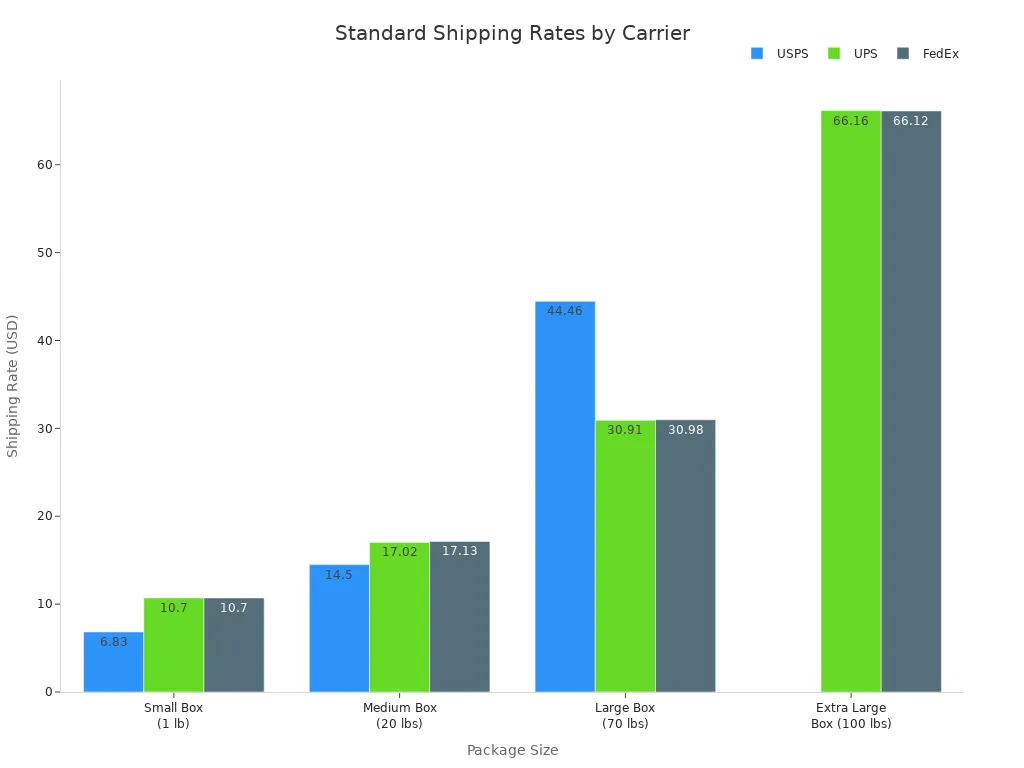
Tip: USPS is best for small packages. UPS and FedEx work well for heavy or urgent shipments.
Discounts and Surcharges
Shipping costs change during busy seasons and for special handling. You see peak surcharges from November to December. UPS adds 60 cents per package during holidays. FedEx charges up to $8.75 per package at peak times. USPS raises Priority Mail prices by about 4.1% during surges. You pay more for extra handling or high-volume shipments.
Provider | Type of Charge | Amount/Details |
|---|---|---|
UPS | +$0.60/package (Nov 23–Dec 27) | |
FedEx | Peak Surcharge | $7.50–$8.75/package during peak |
USPS | Surge Pricing | +4.1% for Priority Mail |
UPS | Variable Surcharge | Triple/quadruple fees for high-volume shippers |
FedEx | Additional Handling Fee | $6.75–$9.75 |
USPS | Flat Surcharges | Higher costs for heavy parcels |
Note: Always check for seasonal surcharges before you ship.
Cost Transparency
You want clear pricing when you choose a shipping provider. USPS gives you simple, low rates for small packages. FedEx and UPS show higher prices, but you get fast delivery for urgent or large shipments. DHL offers many service types, so prices vary. Amazon Logistics focuses on e-commerce, and rates depend on your business agreement.
Factors that affect your shipping cost include:
Package size
Weight
Desired delivery speed
Distance traveled
Selecting the right carrier takes careful planning. Each company has strengths that match different shipping needs. You save money by matching your package type and delivery speed with the right provider.
Delivery Speed

Domestic Delivery
You want your packages to arrive quickly. Each provider offers different speeds for domestic shipping. FedEx, UPS, USPS, DHL, and Amazon Logistics all compete to deliver your parcels on time. You can choose from several ground services:
USPS Ground Advantage
UPS Ground Saver
FedEx Ground Economy
DHL Small Parcel
These services help you send packages across the country. DHL delivers in 2 to 8 working days for small parcels. Other carriers do not publish average delivery times for ground services, but you can expect similar timeframes for standard shipments.
Carrier | Average Delivery Time |
|---|---|
DHL | 2 to 8 working days |
FedEx | N/A |
UPS | N/A |
USPS | N/A |
Amazon Logistics | N/A |
Tip: If you need the fastest delivery, choose express options like FedEx Priority Overnight or UPS Next Day Air.
International Delivery
You may need to ship packages overseas. Providers like DHL, FedEx, and UPS offer fast international delivery. DHL has a strong network and reliable service for urgent shipments. FedEx gives you many express and economy choices. UPS focuses on speed and tracking. You can see how these providers compare:
Provider | Strengths | Weaknesses | Ideal For |
|---|---|---|---|
DHL | Extensive network, reliable service, many shipping options | Can be expensive | Businesses and individuals with diverse shipping needs |
FedEx | Wide range of express and economy options, strong customs support | Can be expensive | Businesses needing fast, reliable delivery |
UPS | Renowned for speed and reliability, excellent tracking | Focused on express shipments | Businesses prioritizing speed and tracking |
Note: DHL works best for urgent international shipments. FedEx and UPS also deliver quickly and reliably.
On-Time Performance
You want your packages to arrive when promised. On-time delivery rates show how well each provider performs. UPS leads with a 96.5% on-time rate in 2024. FedEx follows with 91.8%. USPS has a 90.4% rate. Amazon Logistics handles over 25 million parcels per day, showing strong capacity.
Carrier | On-Time Delivery Rate 2024 | On-Time Delivery Rate 2023 |
|---|---|---|
UPS | 96.5% | 98.7% |
FedEx | 91.8% | 98.3% |
USPS | 90.4% | 96.5% |
Amazon | Exceeded 25 million parcels/day | N/A |
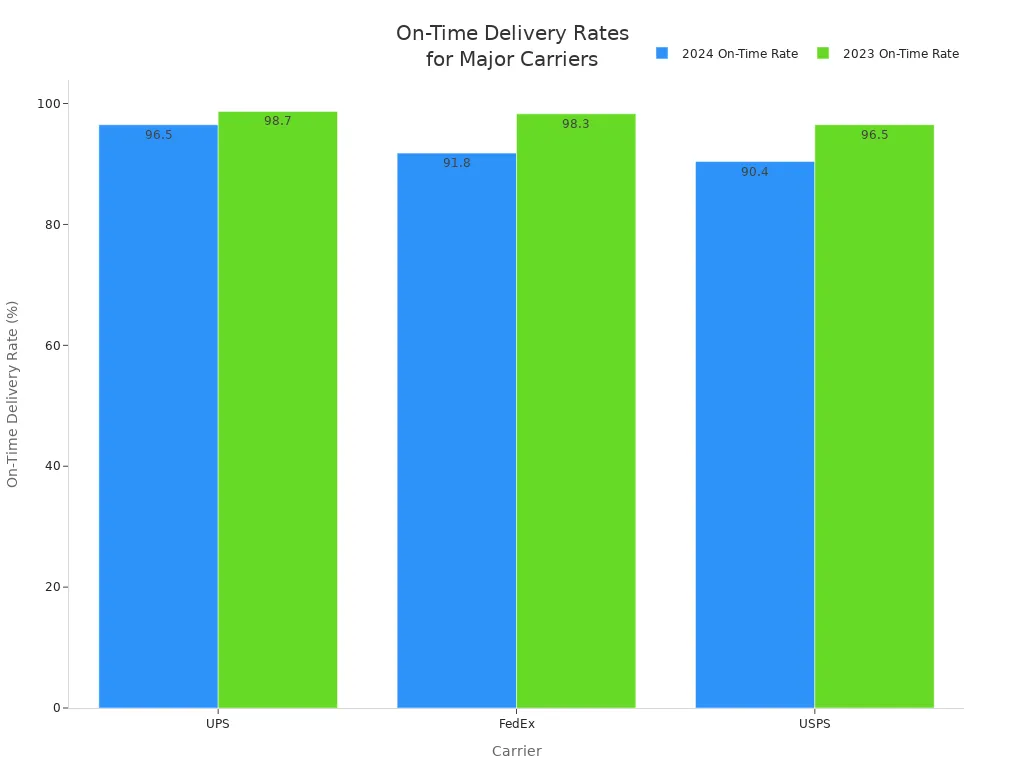
If you want the highest chance of on-time delivery, UPS gives you the best performance.
Reliability
Tracking and Visibility
You want to know where your package is at every step. Express logistics providers use advanced tracking tools to help you see your shipment’s journey. Real-time updates let you check delivery status from your phone or computer. Some companies use predictive analytics to estimate arrival times and spot delays early. You can also get proof of delivery and route optimization features. Here is a table showing popular tracking technologies:
Provider | Key Features |
|---|---|
FarEye | Real-time tracking, route optimization, proof of delivery management, integration with 250 carriers. |
Fourkites | Predictive analytics, extensive visibility into shipments, monitoring of cargo from origin to destination. |
Shippeo | Real-time insights across transport modes, predictive analytics, unified view of logistics operations. |
Tip: Use tracking apps to get alerts and updates so you never lose sight of your package.
Claims and Issue Resolution
Problems can happen during shipping. You need a quick way to fix them. Most providers ask you to open a claim online. You attach proof of value, like an invoice or receipt. If your package is damaged, you upload a photo. The process depends on the company and sometimes the local driver or hub.
When something goes wrong, customer service and the claims process make all the difference. UPS and FedEx require the receiver to open a ticket with tracking on their website and attach proof of value (invoice/receipt) and, in the case of damage, a photo of the damage. The experiences vary and are often tied to the local driver/hub. Some eBay sellers have reported that UPS is more consistent with tracking and handling heavy packages, while others find FedEx slightly cheaper on certain routes or more flexible on express.
You get faster results if you provide all the needed information. Always keep your tracking number and receipts.
Customer Satisfaction
Reliability means happy customers. You want your packages to arrive on time and without damage. Some providers score higher for reliability and service. Old Dominion Freight Line leads with a 99% on-time delivery rate and a 99.7% claim-free service rate. Estes Express Lines also shows strong performance and safety. Saia keeps a low claims ratio and consistent results.
Provider | On-Time Delivery Rate | Claim-Free Service Rate | Additional Notes |
|---|---|---|---|
Old Dominion Freight Line | 99% | 99.7% | Leader in reliability, multiple awards. |
Estes Express Lines | 98% | N/A | Outstanding safety record, comprehensive services. |
Saia | 97% | N/A | Consistent performance, low claims ratio. |
Reliable shipping builds trust with your customers and helps your business grow.
Global Reach
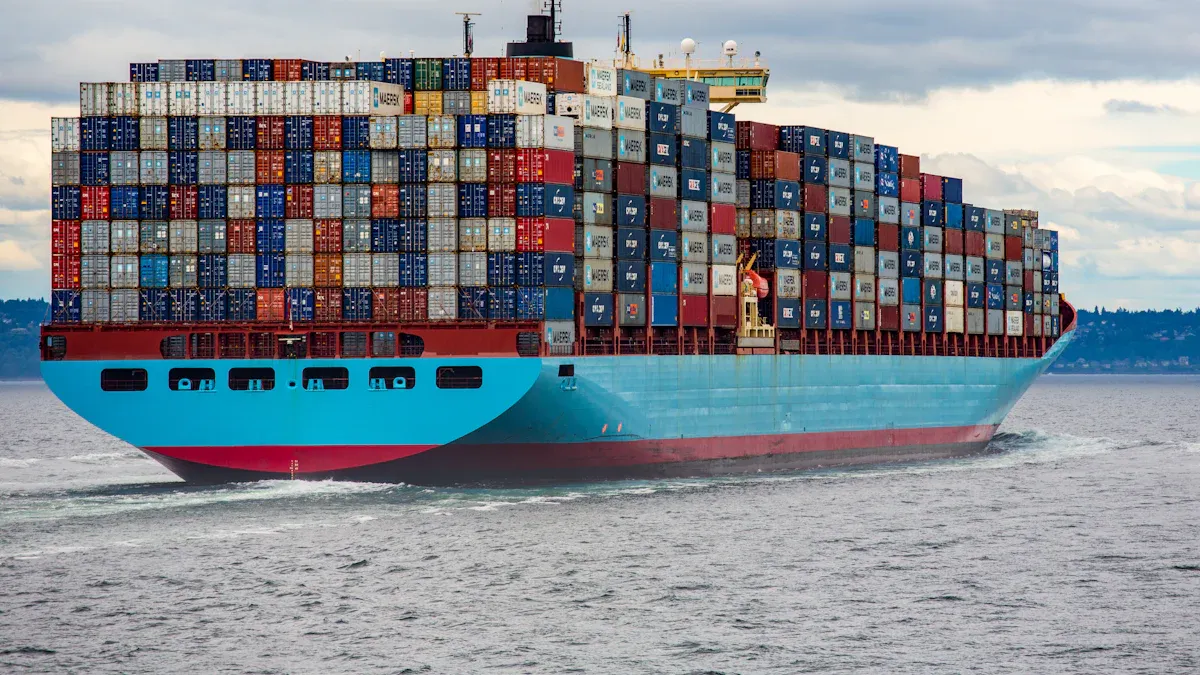
Regional Coverage
You want your shipments to reach customers in every major region. Express logistics providers invest heavily in infrastructure across North America, Europe, and Asia. In North America, you see strong networks that support both business-to-consumer and business-to-business deliveries. Providers like FedEx, UPS, and DHL build large distribution centers and use advanced technology to move packages quickly.
Europe stands out for high-volume outbound shipments. You benefit from efficient cross-border routes and established hubs in cities like Frankfurt, London, and Paris. DHL and UPS offer strong coverage, making it easy for you to ship to major European markets.
Asia Pacific leads in trade volumes. E-commerce exporters rely on express services to reach customers in China, Japan, and Southeast Asia. DHL and FedEx expand their operations to handle growing demand. You get access to fast delivery and reliable service in this region.
Tip: Choose a provider with proven infrastructure in your target region. This helps you avoid delays and reach more customers.
Region | Leading Providers | Key Features |
|---|---|---|
North America | FedEx, UPS, DHL | B2C/B2B flows, strong transit |
Europe | DHL, UPS, FedEx | High outbound volume, hubs |
Asia Pacific | DHL, FedEx | E-commerce, fast expansion |
Cross-Border Capabilities
You need your packages to cross borders smoothly. Express logistics providers offer customs support and fast clearance. DHL leads in cross-border shipping, with coverage in over 220 countries. FedEx and UPS also provide strong international services. You get help with paperwork and tracking, which reduces the risk of delays.
Providers use digital tools to manage customs forms and monitor shipments. You receive updates at every stage. Amazon Logistics focuses on e-commerce, helping you reach global customers with reliable last-mile delivery.
Fast customs clearance
Real-time tracking for international shipments
Support for complex documentation
Note: Reliable cross-border capabilities help you grow your business and keep customers satisfied.
Technology
Digital Tools
You use digital tools every day to manage your shipments. Express logistics providers give you online dashboards, mobile apps, and automated notifications. These tools help you schedule pickups, print labels, and track packages with just a few clicks. FedEx and UPS offer advanced platforms that let you see delivery status and manage returns. DHL gives you global shipment management with easy customs forms. USPS keeps things simple with online tracking and label printing for every U.S. address. Amazon Logistics uses smart routing and real-time updates for e-commerce orders.
Provider | Digital Tool Highlights |
|---|---|
FedEx | Advanced dashboard, label printing |
UPS | Mobile app, shipment management |
DHL | Global tracking, customs support |
USPS | Simple tracking, label creation |
Amazon Logistics | E-commerce integration, smart routing |
Tip: Choose a provider with digital tools that match your business needs. You save time and reduce errors when you automate shipping tasks.
Real-Time Tracking
You want to know where your package is at every moment. Real-time tracking gives you peace of mind and helps you plan for delivery. FedEx and UPS provide next-day or two-day delivery options for urgent shipments. Amazon Logistics offers same-day delivery in select areas. USPS reaches every U.S. address, including rural locations, while FedEx and UPS may charge extra for remote areas. DHL stands out for international shipments with fast customs processing and global reach.
FedEx and UPS: Fast delivery, detailed tracking for urgent shipments.
Amazon Logistics: Same-day delivery and live updates for e-commerce.
USPS: Accessible tracking for every address, even rural.
DHL: Best for international tracking and customs speed.
The market for live package tracking is growing. E-commerce drives this change, and customers expect to see their package location in real time. Companies use data analytics to show delivery times and exceptions. You get alerts for delays or problems, which helps you solve issues quickly. Real-time tracking improves customer experience and makes last-mile delivery more reliable.
Note: Real-time tracking helps you build trust with your customers. You can answer questions and fix problems before they affect your business.
Customer Support
You need strong customer support when you ship packages. Good support helps you solve problems fast and keeps your business running smoothly. Each express logistics provider offers different levels of help. You should know when you can reach them and how you can contact them.
Availability
You want to reach customer support when you need help. Some providers offer support all day and night. Others have limited hours. Here are some examples:
Express Family of Companies gives you access to a 24/7 Live Routing Center. You can call (814) 454-4373 any time.
UPS offers 24/7 phone support. You can get help day or night.
FedEx, DHL, and USPS have set hours for customer service. You may need to check their websites for exact times.
Amazon Logistics does not list public support hours. You may need to contact them through your business account.
Tip: If you ship urgent packages or need help after hours, choose a provider with round-the-clock support.
Support Channels
You want easy ways to contact customer support. Most providers offer phone support. Some give you email or chat options. You can see the main support channels in the table below:
Carrier | Phone Support | Email Support | Chat Support |
|---|---|---|---|
DHL | Yes | Yes | Yes |
FedEx | Yes | Yes | N/A |
UPS | Yes (24/7) | N/A | Yes |
USPS | Yes | N/A | N/A |
Amazon Logistics | N/A | N/A | N/A |
You get more choices with DHL. You can call, email, or chat online. FedEx lets you call or email. UPS gives you phone and chat support, and you can reach them any time. USPS only offers phone support. Amazon Logistics does not list public support channels.
Note: If you want fast answers, try chat or phone support. Email works well for less urgent questions.
Special Capabilities
Cold Chain & Perishables
You need special care when shipping items that must stay cold or frozen. Express logistics providers offer solutions to keep your goods fresh and safe. You can use specialized packaging and handling to prevent damage during transit. Real-time monitoring and temperature-control systems help you track your shipment and make sure it stays within the right range. Providers follow IATA Perishable Cargo Regulations and local rules to keep your shipments compliant.
Specialized packaging and handling protect freshness.
Real-time monitoring and temperature control keep products safe.
Providers follow international standards for perishable cargo.
Global reach allows you to ship worldwide with air freight, customs clearance, and last-mile delivery.
Cold storage warehousing keeps your inventory in good condition.
Frozen and cold FTL and LTL freight services help you move goods efficiently.
Continuous remote monitoring and geo-fencing give you alerts if temperatures change.
Tip: Choose a provider with proactive temperature alerts to prevent spoilage.
Dangerous Goods
Shipping dangerous goods requires strict safety steps. Major providers like FedEx, UPS, and DHL accept dangerous goods in excepted quantities for international delivery. You must ship these items in boxes, not envelopes, and only to approved countries that follow IATA rules. Staff who handle hazardous materials must have special training and certification under US DOT regulations. Non-compliance can lead to fines or legal trouble.
Providers waive normal surcharges for excepted quantities.
Shipments need contracts or pre-approval.
Boxes must meet size requirements (at least 7” x 4” x 4” for FedEx).
Experts assess risks and analyze goods for safety.
Note: Always check if your shipment needs special approval before sending dangerous goods.
E-commerce Solutions
You want easy ways to connect your online store with shipping services. Major carriers offer strong e-commerce integration tools. You can manage orders, print labels, and track shipments with web services and APIs. Here is a quick look at what each provider offers:
Carrier | |
|---|---|
FedEx | Web Services for shipment management, FedEx Compatible program for third-party solutions. |
UPS | UPS Marketplace Shipping for order processing, UPS Developer Kit APIs for various shipping functions. |
DHL | Web interfaces for different regions, Fulfillment Portal, and APIs for integration with minimal coding. |
USPS | Web Tools APIs for shipping solutions, third-party tools for enhanced delivery management. |
Amazon | Fulfillment by Amazon for order handling, Multi-channel fulfillment for integrating with various platforms. |
If you run an online store, these solutions help you automate shipping and improve customer satisfaction.
Comparison Table
You want to see how each express logistics provider stacks up. This table gives you a clear view of the main features and strengths for FedEx, UPS, DHL, USPS, and Amazon Logistics. Use this express logistics services comparison to help you choose the best fit for your shipping needs.
Feature | FedEx Express | UPS | DHL Express | USPS | Amazon Logistics |
|---|---|---|---|---|---|
Speed | Fastest overnight | Fast overnight | Fast international | Slower for express | Fast for e-commerce |
Cost | Higher for express | Good for ground | Higher for express | Lowest for small | Varies by contract |
Reliability | High | Very high | Highest (global) | Good | High (e-commerce) |
Global Reach | 220+ countries | 220 countries | 220+ countries | Limited | Growing |
Tracking | Real-time, detailed | Real-time, detailed | Real-time, global | Basic | Real-time, app-based |
Customer Support | Phone, email | 24/7 phone, chat | Phone, email, chat | Phone only | Account-based |
Special Services | Cold chain, dangerous goods | Heavy freight, dangerous goods | Cold chain, dangerous goods | Simple parcels | E-commerce, last mile |
Tip: Review this table before you decide. You can match your business needs to the right provider.
If you need the fastest delivery, FedEx Express leads.
For the lowest cost on small packages, USPS works best.
DHL Express gives you the most reliable international service.
UPS offers strong support and good value for heavy shipments.
Amazon Logistics fits e-commerce and last-mile delivery.
This express logistics services comparison helps you see the differences at a glance. You can use it to make smart choices for your business.
Recommendations
For Small Businesses
You want to keep shipping simple and affordable. Start by looking for providers that offer low rates for small packages. USPS and UPS often give you the best value. Choose a carrier that lets you track your packages in real time. This helps you answer customer questions quickly. Many small businesses benefit from flexible delivery options and easy-to-use online tools. You can also ask about discounts for regular shipments. When you compare express logistics services, focus on cost, reliability, and customer support.
Tip: Use technology like mobile apps and online dashboards to manage your shipments and save time.
For Enterprises
Large companies need more than just fast shipping. You should look for providers that use AI and GPS to plan the best delivery routes. This reduces travel time and lowers costs. Strong partnerships with carriers help you negotiate better rates while keeping service reliable. Use predictive analytics to manage your inventory and avoid delays. Many enterprises upgrade to fuel-efficient fleets to control expenses. Training your drivers and using automation can boost productivity and ensure on-time deliveries.
Optimize route planning with advanced technology.
Leverage real-time tracking and warehouse automation.
Build strategic partnerships for better pricing.
Forecast demand to keep stock levels right.
For Industry-Specific Needs
Some industries need special shipping solutions. If you ship perishable goods, choose a provider with cold chain services and real-time temperature monitoring. For hazardous materials, make sure your carrier follows all safety rules and has trained staff. E-commerce businesses should look for easy integration with online stores and fast last-mile delivery. Customer-centric solutions, like flexible delivery times and proactive updates, help you build trust with your buyers.
Note: Always match your shipping needs to the provider’s strengths for the best results.
You can use this express logistics services comparison to find the right fit for your business, no matter your size or industry.
You now know which provider is best for speed, cost, reliability, and global reach. FedEx leads in speed. USPS and UPS offer the lowest costs. DHL stands out for reliability and global coverage. Amazon Logistics supports e-commerce growth.
Review your shipping needs.
Match your priorities to each provider’s strengths.
Request quotes or try sample shipments.
Tip: Keep checking your shipping strategy as your business grows. You can always adjust your choice to fit new goals.
FAQ
How do you choose the best express logistics provider for your business?
You should compare speed, cost, reliability, and coverage. Make a list of your shipping needs. Match each provider’s strengths to your priorities. Request quotes and try sample shipments.
What is the fastest shipping option for urgent packages?
FedEx Priority Overnight usually delivers the fastest. UPS Next Day Air Saver also works well. Amazon Logistics offers same-day delivery for some e-commerce orders.
Tip: Always check cutoff times for same-day or overnight services.
Which provider offers the lowest shipping rates for small packages?
USPS Ground Advantage and UPS® Ground give you the lowest rates for small boxes. You save money when you ship non-urgent parcels.
Provider | Typical Rate (Small Box) |
|---|---|
USPS | $6.83 |
UPS | $10.70 |
Can you track your package in real time?
Yes, you can track shipments with FedEx, UPS, DHL, USPS, and Amazon Logistics. Use their websites or mobile apps to see updates.
Real-time tracking
Delivery alerts
Proof of delivery
See Also
Enhancing Import Warehousing And Delivery On The East Coast
Boosting Efficiency In International Operations With Innovative Logistics
Streamlined FCL Export Services Offered Nationwide By PGL
